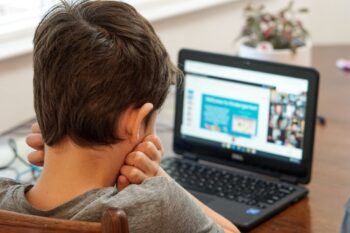The internet can be a great place for shopping, playing games, keeping in touch with loved ones, and learning. Unfortunately, the internet also has people who may try to harm you, identity thieves, and predators. If they’re going to keep safe online, it’s important for your children to understand the potential dangers.
A lot of children feel confident that they know how to stay safe online, but children are often more at risk online than adults. They might not always think through the consequences of what they do online and may be tempted to share too much personal information. They can also be the targets or predators or cyberbullies.
If you’re a parent, you can help your children to stay safe online by talking to them about the way they use the internet, teaching them about the dangers that can online, and learn everything you can about the internet yourself so you can make informed decisions about their usage.
General Online Safety
It can be hard to keep your children completely safe online. Even if you set up your home computer with tight parental controls, your children will still sometimes use other computers that don’t have these controls in place. If your children are going to stay safe on the internet, you will need to teach them how to make smart, responsible decisions, even when you’re not there.
Here are some general tips that you can use when you are trying to teach your children how to be safe online.
- Learn everything that you can about the internet. If you’re familiar with the internet, you will be better able to understand the potential risks they might be exposed to and be better able to talk to your children about it.
- Set standards for what your children are and are not allowed to do online. It is very important that you set clear rules for your kids so they know what you expect from them. Don’t wait until there’s a problem to put rules in place.
- Teach them to keep personal information private. They should know to never post anything like phone numbers, addresses, or the name of their school online.
- Teach your children to use social media safely. If your children have accounts on these sites, what they share could end up in the wrong hands. Make sure they understand to only post something online if they’re comfortable with everyone seeing it. Kids are often very savvy about the technical side of social media and will be the ones teaching you how to post multiple photos on Instagram, but they don’t always think through the consequences of what they share.
- Encourage them to come to you if they have an issue. If they get into trouble, you need them to approach you and not cover it up. Remember that it’s easy to stumble onto bad sites even if they do everything right.
- Talk about internet use. Talk to your children on a regular basis about how they use the internet. If they feel comfortable talking about it with you, they’ll be more likely to come to you if there’s a problem.
Safety At Home
If your children use the computer at home, there are some extra precautions that you can take to make things safer. They will probably use other computers, at school and at the homes of friends, and these precautions won’t protect them when they’re out of the house, but they can still be useful. Choose the right precautions to suit your parenting style and the age of your kids.
- Keep the computer in the living room or another shared area of the house. By doing this, you can reduce the likelihood that your kids will talk to strangers or visit websites they shouldn’t. Older children might be able to have the computer in their own rooms and be trusted with more freedom.
- Install antivirus software. Viruses and other malware are a risk for computers. To protect it, install antivirus software.
- Use a child-friendly search engine. Normal search engines can deliver results that are inappropriate for your children. There are search engines out there that are designed to only deliver results that are suitable for kids. Use these at home.
- Use parental controls. All computers have the option to add some parental controls to your kids’ user accounts. You can set restrictions on what websites they can visit, which applications they can access, and how long they can be on the computer or online.






